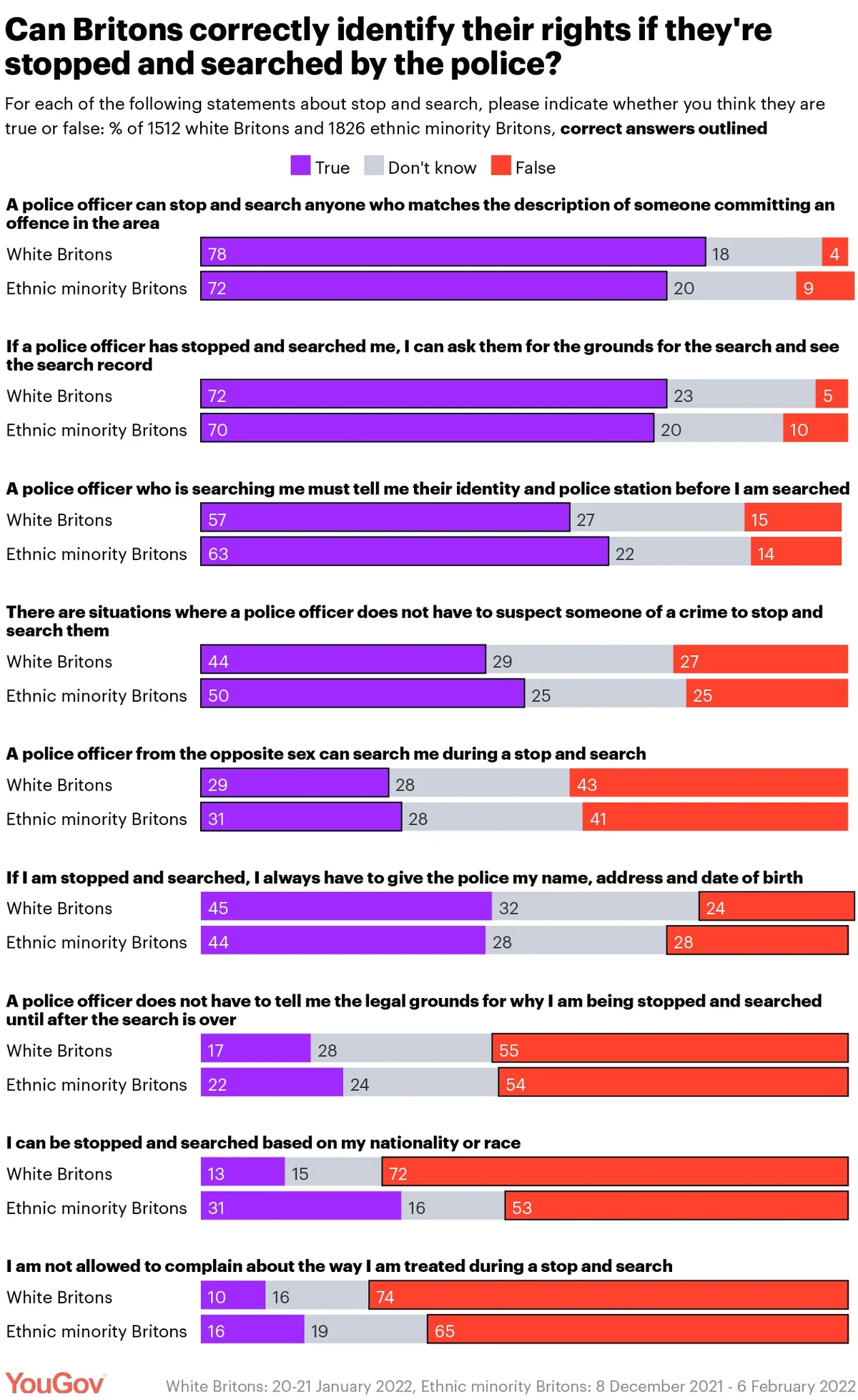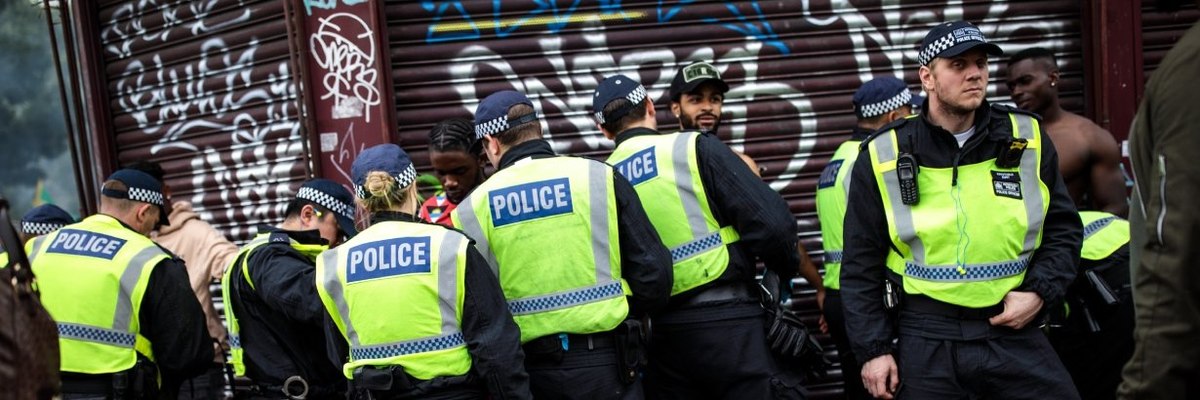Britons of all racial backgrounds don't support giving the police more power to stop and search, and Black Britons are split on whether they support the policy at all
Stop and search powers are disproportionately used by the police to search ethnic minority Britons, particularly Black Britons, and debates continue to rage about their effectiveness at reducing crime and its impacts on inequality and racial profiling.
Stop and search use surged during lockdown, and the government’s new Police, Crime, Sentencing and Courts bill proposes to expand stop and search powers to give the police more authority to search those they don’t suspect of a crime.
But how do Britons – and particularly ethnic minority Britons – feel about current police powers to stop and search?
New YouGov research shows that ethnic minority Britons are much less likely to support the power of the police to use stop and search than white Britons. While they still support stop and search by 53% to 34%, this is 20 points lower than the 73% support among white Britons.
Support is lower still among Black Britons, who are split 44% in support and 43% in opposition to stop and search.
However, when asked about current use of stop and search, ethnic minority Britons are split on whether powers are used too much (32%) or the right amount (30%). Only 11% say they are used too little, and 26% are unsure. Black Britons are much more likely to say that police powers are used too much, at 45%.
White Britons are less sure about how police are wielding their powers (36%). Fewer say ‘too much’ (15%) than ethnic minority Britons, while slightly more say ‘too little’ (17%).
Although showing relatively high levels of support for police powers to use stop and search, ethnic minority Britons oppose expanding such powers, including the ability to search people they do not suspect of committing a crime, by 58% to 29%. Opposition is again highest among Black Britons, with two-thirds (66%) opposed to giving the police such power. White Britons also tend to oppose expanding stop and search, by 48% to 36%.
Is stop and search fair to ethnic minority Britons? Ethnic minority Britons say no, but white Britons are split
Six in 10 ethnic minority Britons say they are either not very confident (35%), or have no confidence at all (26%), in the police’s ability to apply stop and search in a way that is fair to ethnic minorities. Three in ten are confident that the police can be fair with stop and search powers, made up of 22% who have a fair amount of confidence and just 7% who have a great amount of confidence.
White Britons are more split, narrowly tending to have confidence in the police to apply stop and search fairly to ethnic minority Britons (45% to 40%).
The government’s own figures suggest that Black Britons are nine times more likely to be stopped and searched than white Britons, and when asked if they thought people of their racial group get stopped and searched by the police more or less than white Britons, 81% of Black Britons say they get searched more, including 62% who say ‘much more’. Just 3% of Black Britons think they get searched less than white Britons.
Two-thirds of Pakistani Britons (65%) and six in 10 Indian Britons (59%) also think people from their groups get searched more than white Britons. Across all ethnic minorities, 62% say people of their racial group get stopped and searched more than white Britons.
Do stop and search powers make Britons feel safer – and what impact do they have on different types of crime?
It is difficult to measure the absolute impact of stop and search powers. But for both white and ethnic minority Britons, many feel no more or less safe in their local area because of them.
A third of ethnic minority Britons (36%) and 41% of white Britons say the police’s use of stop and search in their local area makes them feel no more or less safe than if they did not have this power. Around a quarter (27%) of both ethnic minority and white Britons say use of stop and search in their local area makes them feel more safe, while 15% of ethnic minority Britons and 7% of white Britons feel less safe as a result.
Similarly, 35% of minority ethnic Britons and 43% of white Britons say the police’s use of stop and search in their local area does not make them feel any more or less confident in the police, while 28% and 27% respectively feel more confident. Ethnic minority Britons are far more likely than white Britons to feel less confident in the police as a result of the use of stop and search, by 20% to just 8%.
When it comes to the impact on specific types of crime, a plurality of Britons of all races think that stop and search reduces knife crime, from 51% of Black Britons to 65% of white Britons. Black and mixed ethnicity Britons are most likely to say stop and search makes no difference to knife crime, at 31%.
Both white (59%) and ethnic minority Britons in general (54%) also think that stop and search reduces drug-related crime, although they are less sure when it comes to theft and burglary (40% and 39% respectively).
However, Britons tend to think stop and search powers make little difference to crimes like graffiti (46% of both white and ethnic minority Britons think stop and search makes no difference) and sexual violence (67% and 56% respectively say stop and search makes no difference).
Can Britons identify their rights if they’re stopped and searched by the police?
We asked the public to say whether they thought a series of statements about stop and search were true or false. Most of the public – both white and ethnic minority Britons – correctly answered most of the questions.
However, ethnic minority Britons are much more likely to erroneously think they can be stopped and searched based on their nationality and race (31%) than white Britons (13%). According to law, nobody can be stopped and searched based only on nationality or race. Some 72% of white Britons and 53% of ethnic minority Britons correctly answered this question.

There were two statements that more of the public got wrong than right. Just 29% of white Britons and 31% of ethnic minority Britons correctly said that a police officer from the opposite sex can search someone during a stop and search, with 43% and 41% respectively incorrectly answering this question. Men are more likely to correctly answer this question than women: 34-36% of men correctly said that an officer of the opposite sex can stop and search someone, compared to 25-26% of women.
Finally, just 24% of white Britons and 28% of ethnic minority Britons know that you do not always have to give the police your name, address and date of birth during a stop and search, with 45% and 44% respectively giving an incorrect answer to this statement.
See results for ethnic minority Britons here and for white Britons here







